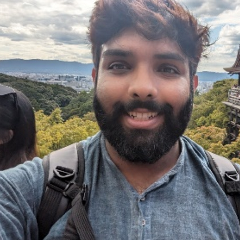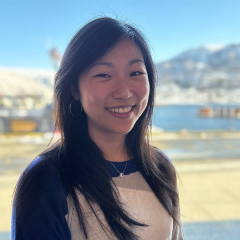
Endometrial Cancer is the most common gynaecological cancer in developed nations. Survival rates are incredibly good in the early stages of the disease but rapidly decrease in patients with advanced tumours. Symptoms of Endometrial Cancer are non-specific leading to only 20% of patients undergoing investigation for Endometrial cancer having confirmed disease. There is a clinically unmet need for a test that can reduce the number of patients undergoing painful and resource intensive investigations thereby reducing healthcare costs and improving peace of mind for patients.
I am currently developing a Lateral flow test device using novel chemistry developed in the Ladame lab. To detect Endometrial cancer, I am utilising a new class of biomarkers: circulating miRNA. These biomarkers display tissue and disease specific profiles and can be quantified to determine not only disease presence. I have been interested in Cancer, detection and treatment since I was young. Previously my focus was on monoclonal antibody treatments of non-small cell lung cancer. My interest on detection shifted after the passing of my grandmother from a rare form of endometrial cancer that went undetected due to its non-specific and atypical symptoms. With better detection and monitoring the hope is that more women will be able to access lifesaving treatments earlier.
I could recite the periodic table in order when I was 12.
I spoke in the house of commons chamber when I was 16.
Now I spend my free time trying to learn languages on Duolingo or getting crushed as white belt in bjj.

This project involves challenging cancer types that are currently treated with toxic chemotherapy, yet the success rates are low. I was determined to generate a form of immunotherapy that was more tolerable and effective. If successful, these sorts of agents could improve patient quality of life considerably.
I ran a half marathon at 17 years old and a full marathon at 19 years old.

Oesophageal cancer ranks as the sixth most common cause of cancer-related death worldwide. Survival rates have remained unsatisfactory, highlighting the need to improve existing therapeutic approaches. In response, my PhD focuses on pioneering a new approach to treat oesophageal cancer using bioharmonophores (biodegradable Second Harmonic Generating nanoprobes). These peptide-based nanoprobes hold great potential to radically improve photodynamic therapy in terms of depth of treatment field, precision targeting and efficacy. Motivated by my aspiration to become a proficient general surgeon, I chose this project with the aim of advancing patient care in the realm of cancer treatment. I hope this novel approach will improve the quality of life of cancer patients suffering with debilitating symptoms such as difficulty swallowing.
I enjoy playing the piano as well as boxing and doing karate in my spare time. I’m also currently training for a half-marathon.


Before starting my iPhD, I completed the first four years of my MBBS degree at Imperial College London. I spent the fourth year of this specialising in Cancer Biology and Medicine. During this year, I became interested in immunotherapy, personalised medicine and brain tumours. This is when I found my iPhD project which encompasses all of these interests.
Glioblastoma is a primary brain tumour with poor prognosis and limited treatment options. Arginine Deprivation by ADI-PEG20 has shown efficacy in other cancer types. Work by our lab has shown complete tumour eradication when Arginine Deprivation is combined with radiation in orthotopic immunocompetent mouse models of glioma. Preliminary data has showed immunomodulatory effects of arginine deprivation alone as well as in combination with radiation. In this project, we aim to elucidate the mechanism of action of arginine deprivation over time using spatial techniques such as spatial transcriptomics and mass-spectrometry based Imaging Mass Cytometry. These results have helped us to think about other therapies we would like to combine with arginine deprivation . Also, these results are helping to guide the design of clinical trial in patients living with Glioblastoma. I chose this project because I was always interested in the brain and immunology. This project allowed me to combine these interests to pursue a translational project which has real clinical potential.
I’m a published short story writer and a professional bartender.

I chose this project because I wanted to learn from people from diverse disciplines and the scope of this project gave me the opportunity to work with the physicists and mathematicians in the Department of Physics as well as the biologists in the Department of Surgery and Cancer. In the end, I got to be a part of both the development and application of this new tool on human cancer cells, aiming to illuminate any underlying mechanisms that have not yet been revealed with other conventional techniques. The hope is that with newer technologies like this, we can obtain a more in-depth understanding of cancer biology to improve the treatment for patients.
I love playing the violin – it’s been with me for most of my life and it’s a wonderful way to destress!

I chose this project as it was really at the cusp of applying the findings from the works of biologists and clinicians to the innovative technologies developed by engineers and materials scientists. The result of this was the development of a dipstick lateral flow device that can detect markers of a subtype of ovarian cancer from fingerpick blood samples within 35 minutes. This technology presents a less invasive, cost and time effective method of monitoring ovarian cancer markers, which would hopefully relieve burdens on patients and health services.
I enjoy crochet, embroidery and sewing. Anything that involves a needle and thread!